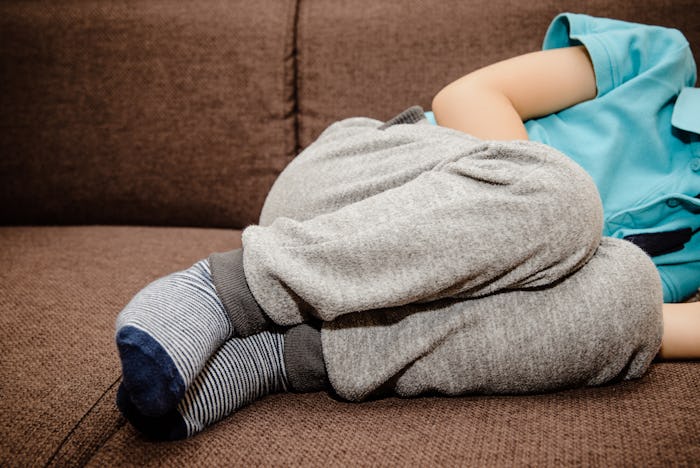Life

8 Physical Signs Of Anxiety, According To Chinese Medicine
Anxiety is not just limited to the thoughts in a person's head. It's very much a physical issue as well. Just ask anyone who has problems with teeth grinding or muscle tightness as a result of anxiety. As it turns out, there are many physical signs of anxiety, according to Chinese Medicine, proving these physical ailments have been linked to stress for a long time.
Originating in ancient China, Traditional Chinese medicine (TCM) refers to the use of herbal medications and mind-body practices to treat health conditions, according to the National Center for Complementary and Integrative Health. It's a wide-ranging discipline that includes practices such as acupuncture and tai chi.
"In TCM anxiety is the inner response to outside reality," as Elaine Katen, program director of the Traditional Chinese Medicine World Foundation, tells Romper. Experiencing anxiety means you are out of balance in some way. "All this is based on a deep understanding of balance which the Five Element Chart shows us. From that, we see how energy flow is impacted by emotions." These emotions affect the Liver, Stomach, and Kidney, and strengthening them can help people process anxiety more easily, as Katen further explains.
To learn more about the specific physical symptoms of anxiety as understood in TCM, Romper spoke with Shannon Lawrence, MATCM, L.Ac, who is on the faculty at Yo San University. "Bringing harmony and balance to the Mind (Shen / Spirit) are the main components in TCM, as well as treating the root cause of all illness, whether physical or emotional," says Lawrence. Anxiety is a disruption of this harmony.
1Complexion Changes
Changes in complexion are one way anxiety show up physically in TCM, as Lawrence says. If changes in your appearance are causing concern, then anxiety may be to blame.
2Issues Falling Asleep
Do you keep lying awake at night, wishing for sleep? Anxiety is caused by an imbalance of the heart system in TCM, and this may result in issues falling asleep, according to Urban Wellness Holistic Healthcare (UWHH). Because the heart system is responsible for sleep patterns, it makes sense that issues here might show up in sleeplessness.
3Heart Palpitations
Heart palpitations are another common marker of anxiety, as Lawrence says. As it turns out, anxiety-induced heart palpitations are commonly noted in Western medicine as well, as noted in AnxietyCentre.com.
4Sweaty Palms
Sweaty palms are another physical sign of anxiety for some people, according to the Hayo'u Method, a self-treatment method inspired by Chinese Medicine. In general, Chinese Medicine recognizes that anxiety symptoms occur as a result of compromised heart functioning, as the site further explained.
5Breathing Issues
Shortness of breath is another anxiety symptom in TCM, as Lawrence notes. There's a reason taking long, slow breaths is a common anxiety management technique, according to Anxieties.com.
6Fidgety Movements
Can't sit still? Agitated, rapid movements are another anxiety signs, says Lawrence.
7Dizziness
Dizziness or lightheadedness is also an anxiety sign, says Lawrence. Because TCM understands anxiety as a form of imbalance, this symptom seems especially fitting.
8Chest Tightness
Lastly, a feeling of tightness in the chest (provided it isn't caused by another medical symptom) is another common marker of anxiety, as Lawrence explains. If these physical signs sound familiar, then consider reaching out to your healthcare provider for help.